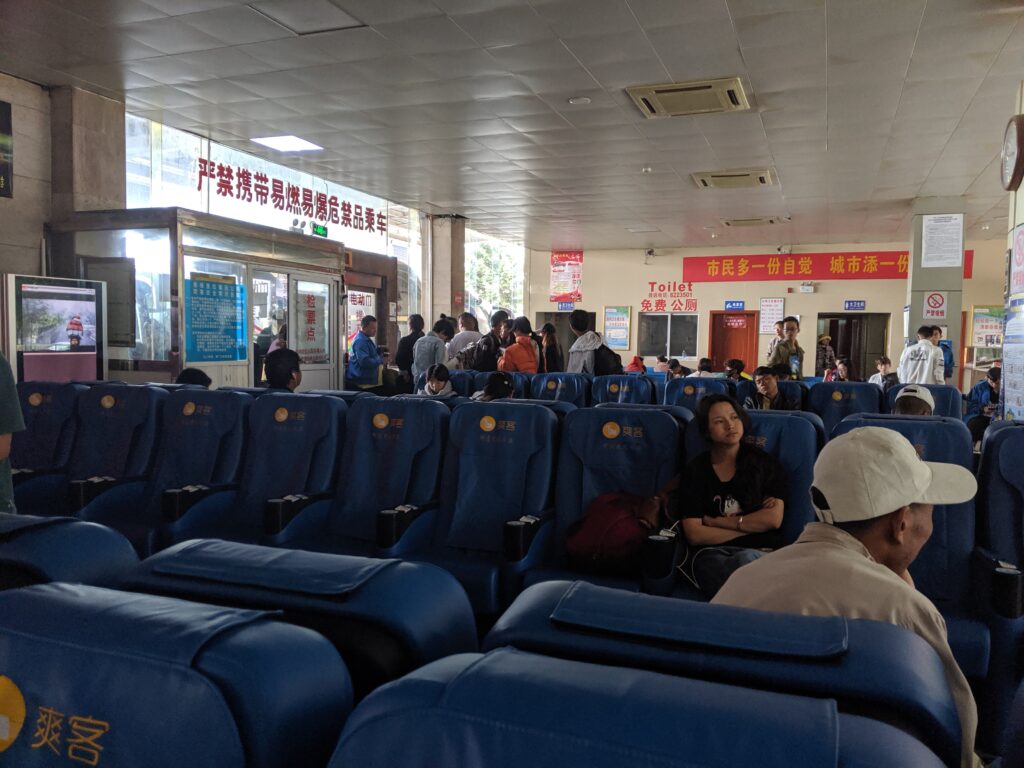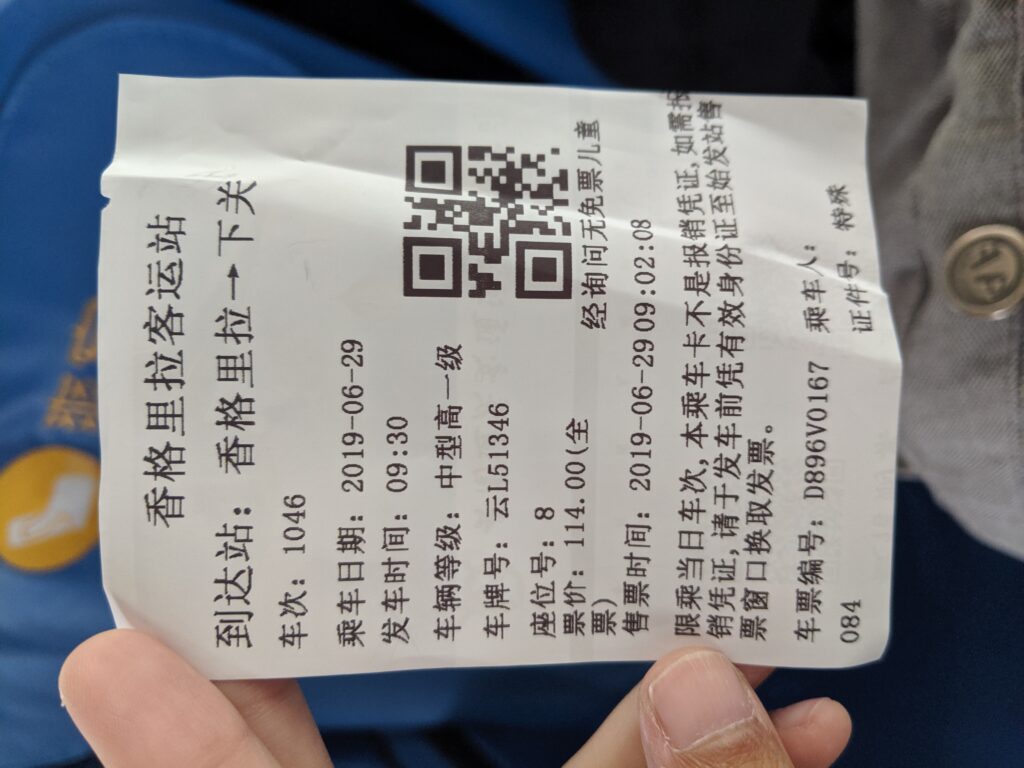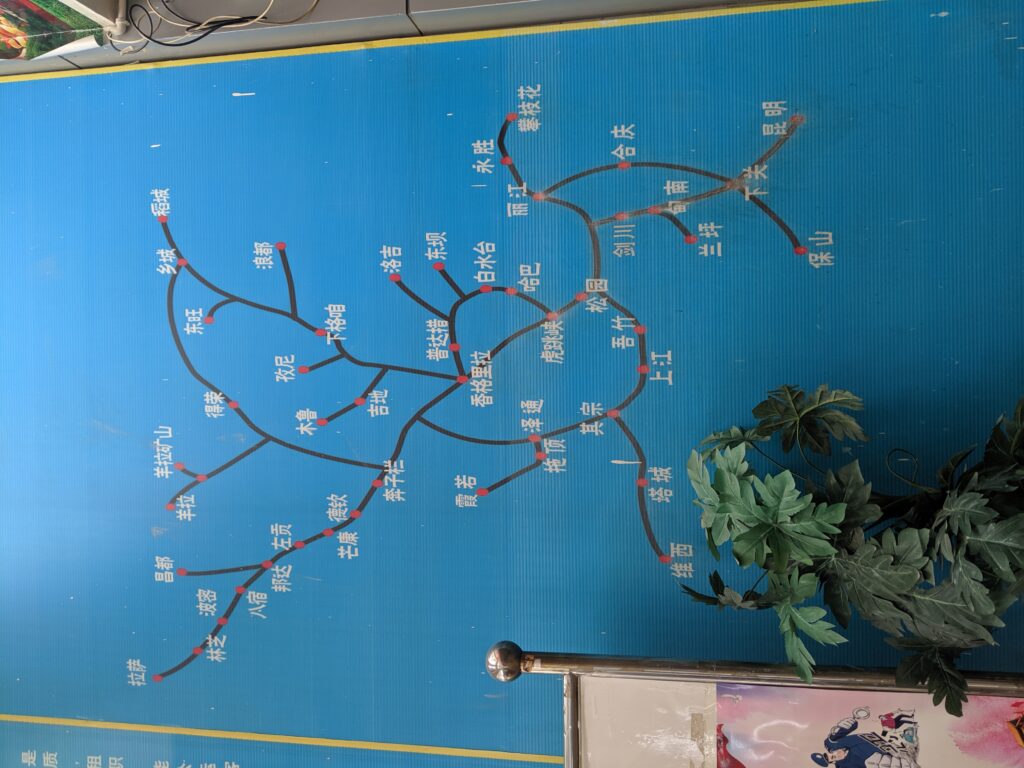Ah Bu Ji Cuo (阿布吉措)
28 June 2019.
We were informed to be ready by 0830. I left my hostel at 0715, walking past the local park where locals were walking their dogs in the morning light and storeowners were stocking up for the day ahead. I wasn’t long into the three kilometer walk before my backpack wore me down and I looked around for a cab. There were loads of cabs but those that passed by me were already ferrying passengers. I continued, taking rests at sidewalks and kept an eye out for cabs to take until I got close enough to the hostel.



Dragging my backpack to another Hostel. 0732 hr.
The last few metres was an uphill climb to the hostel and I was breathless by the time I got to the hostel entrance. Ahead of me was still a flight of stairs leading to the common area of the hostel.
“You’re early,” the manager of the hostel remarked as I stepped through the doorway.
“Yes, I called in last night to book a bed space. A lady answered my call.” I wheezed between words, trying to catch my breath.
“Yes, she told me about you. Your passport please.”
I paid 16 yuan for a bed space that night. It was 12 yuan on Ctrip but Ihad to use Alipay if I wanted to make online payment and I’d rather pay in cash. He showed me to a room just next to the hostel’s common area which was great as it meant that I no longer have to climb stairs for the time being. There were two ladies asleep in the room, one of them with noticeably short hair. She had covered herself up to her nose tip with the blanket and I couldn’t tell if she was my Guangzhou friend. It was 0810 and I wondered if I should wake her up.
“Boss, we are to leave at 0830, aren’t we?”
“Yes, just gather here at 0830, the guide will be here to fetch you two.”
“Uhm I think my friend is still asleep in the room though, should I wake her up?”
“No, no that’s not her! Your friend is in another room.”
The manager asked if I wanted breakfast, the hostel had sets selling at 12 yuan each. With no time to visit the nearest supermarket, I nodded, I have never tried a hostel breakfast set anyway. The breakfast was a fried egg, a bowl of millet porridge and fried dough. Enough to fill me up for the morning but I wondered about lunch. I haven’t got anything edible packed for the hike.
Our Tibetan guide was waiting for us across the road outside the hostel. Tall and lean, his eye wrinkles appeared as he smiled with his shades on. I was most impressed by his Chinese pronunciation. There were three more tourists joining us from the other hostels. Amongst them were two Vietnamese ladies, one of them studied Chinese back in University and spoke rather fluent Chinese. The other tourist was a Chinese guy who involuntarily clung onto his phone on our entire way to Abujicuo.
“Everything ok?” our guide asked him when he finally ended the call.
“It’s work. They keep calling even though I’m on holiday.” he sighed.
“They won’t be able to contact you soon. The place we are going has no signal.”
His phone rang again. “I need a break,” he shook his head and proceeded to answer the call in an exasperated tone. He was one of the engineers with a 996 schedule. It didn’t seem easy. A man on a horse galloped towards our direction from the distance, exchanging greetings with our guide as he passed by.
“Do you know each other?” the guangzhou girl asked.
“No we greet fellow Tibetans all the time. Hardly anyone comes down this road anyway, we’re glad to even see anyone.” Our guide explained that they were nomads living in Abujicuo who travel from place to place with their cattle based on weather conditions.
We were 20 tourists in total who were driven to Abujicuo by three respective guides. The guides had walking poles for each of us and we began our hike with a descent into an open field.



Starting the trek. 1009 hr.
There were neither paved nor marked routes, we had to depend on the guides who have been climbing around this area since they were 8 year old kids. The hike at Abujicuo had a good combination of steep slopes and flat surfaces. Ascent was moderately challenging, the slopes were fairly steep and some areas required one to use their hands to steady oneself. Everyone climbed at their own pace and we were soon segregated into groups, the first group leading in front, a second group somewhere in the middle and a third at the back. Each group had a guide with them and we were so far apart we couldn’t see one another. A sudden ear-piercing bird whistle rang in the air. Our Tibetan guide had formed an air tight cup with his hands and blew through his knuckles. His whistle was so loud and forceful that it echoed around the whole valley. Almost immediately, there was a response; another imitated bird call.
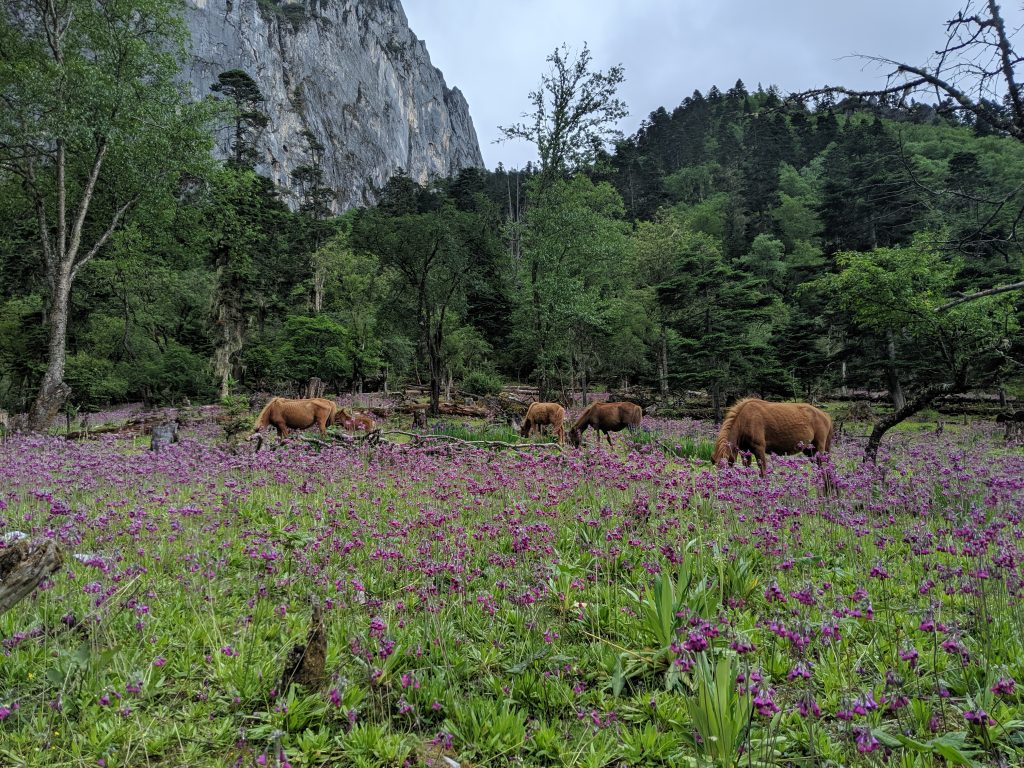
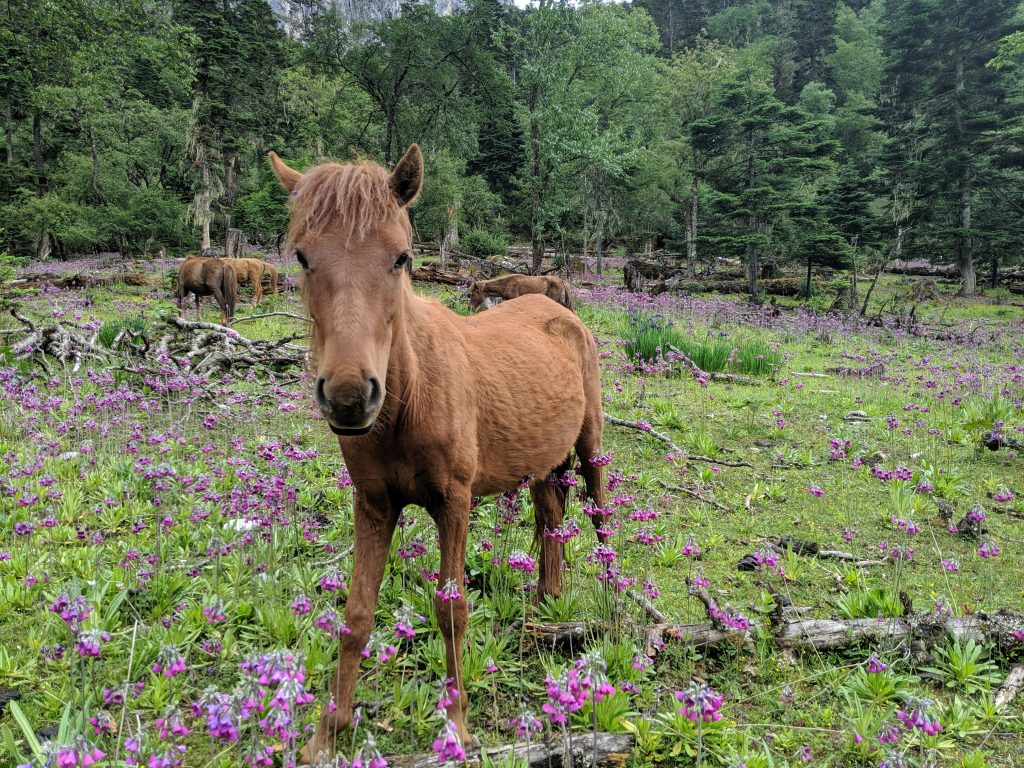




What was different in this trek was that Abujicuo had aplenty of lush foliage.
An hour into the hike, most of us were visibly worn out by the continuous steep ascent. Our guide weaved in and out between the members of our small group, offering to help us with our belongings.
“Just tell me if you need help. We Tibetans are very willing to help.” he offered. I was progressing rather slowly, inhaling deeply with each step to prevent myself from getting out of breadth.
“I know. I’m ok.” I huffed.
Not long after he passed by again, this time with two bags slung over his shoulder and a paper bag of belongings with his hand.
“Let me help you with your bag.” he said, lifting my bag off my shoulders.
“Wait, no need!” I wheezed, he was already a few steps in front of me, now with three bags over his shoulder. It was hard to catch up for he navigated the steep incline with lightning speed. Soon, the route flattened out to a rocky trail and I took the chance to catch up, thinking of a way to get my bag back. Every climber should be responsible for their own belongings and I wasn’t comfortable seeing someone boggled down by others’ baggage.
“Sir, I’ll need the camera in my bag to take photos.” My camera was becoming a convenient excuse.
He stopped and handed me my bag. I unzipped it to retrieve my camera.
“Well, you can just hold the camera, I’ll carry your bag.” he said. For a moment I didn’t know the answer to that.
“Oh no sir, I’ll need to change lenses at times.” I gushed.
He nodded. He had seen me stop to change lenses during the hike. His earlier help with my bag had already brought some relief to my sore shoulders and I moved on much faster this time. My bag no longer felt as heavy. Moreover, our destination for the day was already within sight. “It’s Hong Jing Tian!” a lady in front of us squealed. They had spotted the plant of a Chinese herb, known as the golden root (红景天) which is said to protect one against altitude sickness. They grew at high altitudes and were harvested mostly by the nomads as another source of income. “We could pluck it ourselves and sell them.” they joked, but did nothing more than taking another harmless look at the wild plant. Everyone was feeling light hearted as we got closer to the lake. Prayer flags hung on a small hill overlooking the lake flutter in the strong winds, carrying bouts of well-wishes for all people.
“Are you from Malaysia?” I asked a bespectacled lady as we made our way down. I had noticed that her accent sounded similar to mine.
“No I’m from Singapore.” She replied.
“Me too! I wouldn’t have known if you didn’t say so!”
She had enrolled herself in a Chinese language course in Beijing for a year and was now travelling. Although she already knew basic Chinese as a Singaporean, she insisted that she wasn’t good in writing. We talked about our journeys. “I’m going to India.” she said.
“Alone?”
“Yeah.”
“I want to go to India too but I’m not ready to go alone just yet. When are you going?”
“Tomorrow.”
She had a thirty hour flight to New Delhi tomorrow, with a transit at Kuala Lumpur.
“I bought the cheapest air ticket.”
“I would do that too.” I laughed.
She was going to learn yoga at a monastery for two months there and I was amazed that she seemed rather calm about taking such a long flight to India tomorrow. Evidently, she wasn’t the typical tourist, she had a strong purpose for her travels which could seem rather bizarre but I did admire her courage to seek her own unique experiences. I have met Chinese travellers who embodied this spirit and I certainly didn’t think I would meet a Singaporean with a similar mindset whilst on a hike in Shangrila.



I think I see something in the distance! 1314 hr.


The Lake. 1324 hr.
On our drive back, the previously heavy atmosphere lifted. Everyone had finished the hike and the Chinese engineer was no longer bothered by calls from his company. We got to know our guide better throughout the three hours in Abujicuo, he was firm but warm hearted and we felt as if we could ask him anything.
“Do you have children, sir?” I asked. I have always been rather cautious of asking such a question as it could be rather sensitive. Yet somehow that day, I felt compelled to ask that question.
“Yes, I do.” he replied.
“How many children do you have sir?”
“I have two daughters. Guess how old my eldest daughter is,” he said.
“Ten?” the Vietnamese lady suggested.
“Five..?” I said.
“She’s fifteen.” he replied. With one hand on the steering wheel, he retrieved his phone from his pockets and looked through it.
“Here’s my younger daughter.” He passes me his phone. It was a photo of a pretty fair-skinned girl in Tibetan traditional costume.
“She has your nose,” I pointed out the obvious. “And she’s so fair-skinned!” I exclaimed.
“Tibetans are not born dark-skinned, you know?” he laughed.
As his phone made its round amongst the rest of us, he told us about how their children need not work as hard as their parents and hence had fairer skin.
“Can your daughters speak Chinese as well as you do?”
“They can speak Chinese. But we Tibetans speak Tibetan amongst ourselves of course. If you are Tibetan and you choose not to speak Tibetan to your own people, we would think it’s ill-mannered of you.”
He then showed us a picture of his elder daughter. She was in high school, where they had a good mix of Tibetan and Chinese students. We asked about his preference of the race of his future son-in law. “I won’t restrict them but I would prefer for them to marry a Tibetan.” he replied. “Tibetans have a strong moral compass within them.”
Our guide himself had an arranged marriage in his early twenties. He wouldn’t wish it on his daughters although he was happily married. “Tibetans make an honest living.” he stressed. “We wouldn’t do anything that would rack our conscience. You’ll probably never hear of Tibetans smuggling drugs.”
We were passing by a Tibetan village when he tapped on his side window. “The first building you see is my house.” he said. He shared about what seemed like a high level of camaraderie amongst their village people. Everyone in the village lent a helping hand to build each family a house. All the village children who attended boarding school and came home weekly were ferried by any adult who had free spaces in their vehicle.
“I heard you don’t kill the female cows,” I said, recalling what the teenage girl told me in Litang.
“No, we kill all.”
“But the female cows give birth, don’t they?”
“We will still kill them, who told you we didn’t kill the females?”
“A Tibetan girl in Litang.”
“Well, we will kill all.”
We asked if he had ever thought of moving to the capital, Kunming. He didn’t see any reason to move there. He could speak Chinese and Tibetan but wasn’t literate. It would be difficult to make a living.
“If there’s one thing Tibetans aren’t good at, its studying.” he chuckled. “Other than that, we can do anything under the sun.”
“Do you get the 1000 we paid, in full?” I asked, citing the five of us who had paid 200 yuan each on this trip. There was still the middleman who contacted them to guide us as well as the hostels who recruited us to be paid, he said. He would probably get about 600 yuan out of the 1000 yuan we five paid that day.


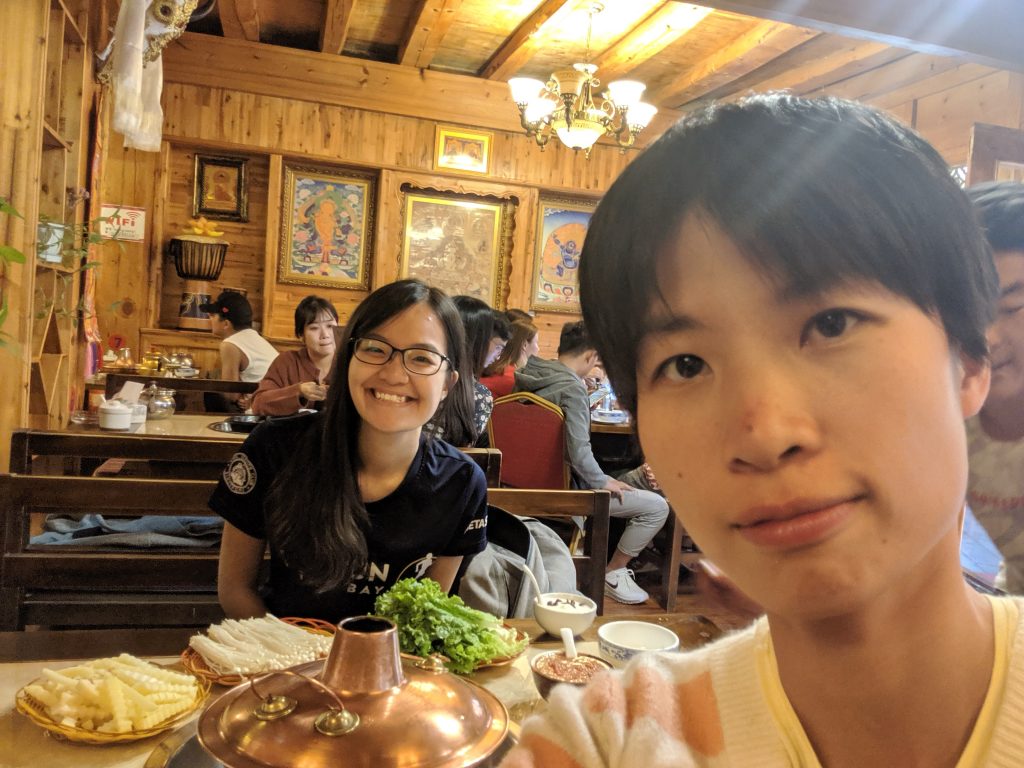
Hotpot. 1913 hr. We walked around DukeZhong Ancient Town later that night before returning to the hostel.



Back at the second hostel. 2313 hr.
Accomodation.
1.) Shangrila International Youth Hostel (YHA)
Length of Stay: 2 Nights
Type of Room: Bed space in 8 bed dormitory (30 Yuan per night)
Address: 建塘镇建塘居民三组44
Air Conditioning: No. No need for it, it was cold enough.
Towels: Not provided
Personal Locker: Not provided
Location: The hostel is located along one of the local residential streets with a bus stop that has a direct bus to the bus station. It is possible to walk from here to the other tourist destinations however, there can be better options at a lower price.
2.) 香格里驴院青年旅舍
Length of Stay: 1 Night
Type of Room: Bed in 6 people dormitory (16 Yuan per night)
Address: 北门街措廊71号
Air Conditioning: No. No need for it, it was cold enough.
Towels: Not provided
Personal Locker: Not provided
Location: This hostel is quite a popular option amongst domestic tourists. They offer a range of day trips and the premises are rather well-maintained. It is located within the Dukezong Ancient Town, although you will have to walk a little further to the nearest supermarket.
Further Comments:
Journey to Dali
Buses leave frequently from Shangrila to Dali with the total journey taking around 6 hours. There are two pickup points for buses leaving from Shangrila, the Shangrila Bus Station and the Dukezong Ancient Town. There are also two drop off points in Dali, Xiaguan in Dali New City and Dali Ancient Town. These will be clearly stated when you search for bus schedules on Ctrip which helps a lot in planning accommodation. Dali’s train and bus station are located within Dali New City/ Xiaguan which is 11KM away from Dali Ancient Town.

